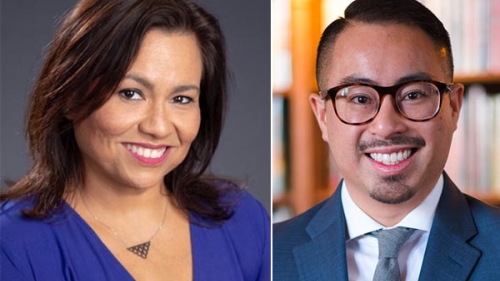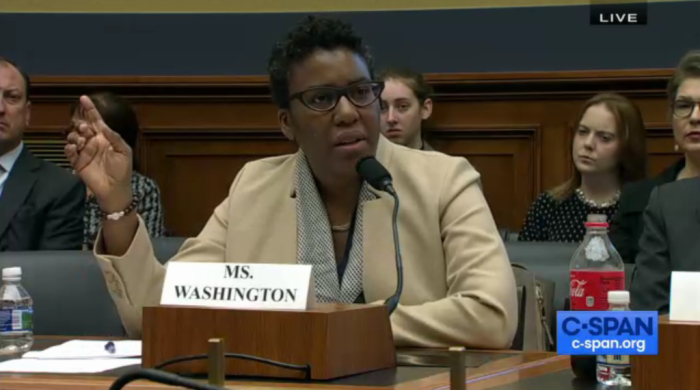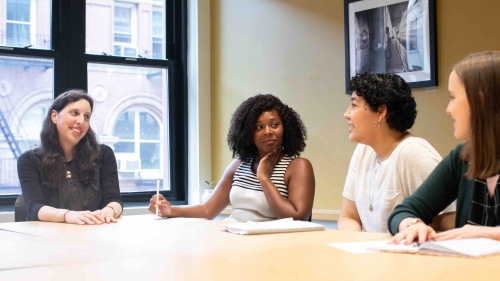As the Supreme Court hears challenges to the admissions practices of Harvard and the University of North Carolina, the NYU Steinhardt Institute for Higher Education Policy hosted an event to provide clarity on the issue of affirmative action and delineate the details of these new cases.
The event, “Affirmative Action and the Supreme Court: Why now? Why again? What’s next?,” featured remarks by Assistant Professor of Education Mike Hoa Nguyen and University of Texas Austin Professor Stella Flores, as well as moderation by the Institute’s director, Professor of Higher Education Ann Marcus.

Stella Flores and Mike Hoa Nguyen
The Institute hosted a similar discussion in 2016, in the aftermath of the pivotal Fisher v. University of Texas case, which upheld the constitutionality of affirmative action. The new cases are brought by Students for Fair Admissions (SFFA), which seeks to ban the consideration of race in college admissions and argues that current practices discriminate against Asian Americans and violate federal law by using "race-conscious" admissions practices.
Both Flores and Nguyen bring research expertise and experience composing and supporting amicus briefs on the question of affirmative action. Each emphasized the importance of affirmative action as a necessary but insufficient foundational tool for ensuring educational equity for all.
“The vital utility of affirmative action is that it is one tool through which we can build diverse institutions of higher education and support students while they’re there,” said Nguyen. “It is a federal policy that acknowledges that structural racism exists, and that symbolism is very important.”
One important role for education researchers is to inform the work of the Court by providing rigorous research and scholarship, so that legal decisions can be made based upon empirical fact, rather than on harmful stereotypes or inaccurate assumptions about college students and admissions practices.
Nguyen, who joined NYU Steinhardt’s Department of Administration, Leadership and Technology this year as one of three faculty cluster hires, also offered particular insight into the position of the Asian American community both within affirmative action conversations broadly and within these particular cases.
“The Asian American community is unbelievably diverse and complex in terms of history, immigration status, income, language, educational attainment… There is no one voice,” Nguyen said. As such, though the lawsuits brought forth by SFFA claim to represent the interests of Asian Americans, they fail to capture the complexity of the situation – or to be transparent about their motives.
Mike Hoa Nguyen and his amicus brief co-authors in front of the Supreme Court.
“Empirical studies have shown that most Asian Americans support race-conscious admissions,” Nguyen said. “In fact, in one SFFA lawsuit against Yale, they intentionally excluded certain subgroups, particularly Southeast Asian Americans, because these groups are very much benefiting from race-conscious admissions. I read this as a clear example that their lawsuits are not trying to bring justice for all Asian Americans, but are instead using the Asian American community to create a society that ignores the reality of structural racism.”
For both Flores and Nguyen, abolishing affirmative action would heighten the already-existing gaps in educational attainment and success amongst students of color, requiring individual states and institutions to take on the onus of developing plans to promote educational equity. Education researchers are vital to shaping these conversations and decisions, whether at the institutional, state, or federal levels.
Nguyen’s co-authored amicus brief on behalf of over 1,240 social scientists was discussed during oral arguments on October 31, and he emphasized the role that expert research plays in these cases.
“There is a high amount of intentional misinformation regarding these two cases, particularly concerning Asian Americans. One important role for education researchers is to inform the work of the Court by providing rigorous research and scholarship, so that legal decisions can be made based upon empirical fact, rather than on harmful stereotypes or inaccurate assumptions about college students and admissions practices,” Nguyen said.
The Court’s decisions on both cases will likely be released in June.
Related Articles
NYU Steinhardt Welcomes New Faculty
NYU Steinhardt's newest faculty members include educators, scholars, poets, activists, writers, artists, and more.
Anne Washington Testifies Before Congress about Artificial Intelligence and the Financial Industry
Anne Washington, assistant professor of data policy at NYU Steinhardt, shared her research on artificial intelligence at a congressional hearing.



